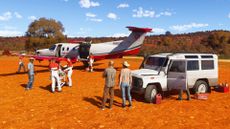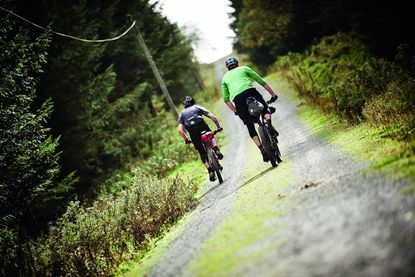

E-MTB vs MTB: it's the latest big decision in mountain biking. Go to any mountain bike trail centre these days and there will be almost as many e-mountain bikes bouncing around the place as regular mountain bikes.
But E-MTBs don’t come cheap (you can expect to pay north of £4k for an E-MTB that will handle ‘proper’ mountain biking without falling apart), so what are the differences between the two that you should be looking out for if you decide to go electric?
Before you head off to check out the best electric mountain bike or the best mountain bike, here's what you need to know.
E-MTB vs MTB: The power source
A pretty obvious one to start with – on a regular MTB YOU are the power source, whilst an E-MTBs is, of course, powered by a combination of motor, battery and rider. The fact that there’s a motor on an E-MTB doesn’t mean that the rider doesn’t have to make an effort, however; and whilst detractors will scoff and proclaim that e-biking is not ‘real’ mountain biking, most keen E-MTB riders find that they’re just as knackered after a big day in the saddle on their E-MTB as they are after a day out on their regular MTB.
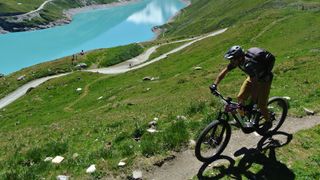
So how’s that when the motor is doing all the work? Well, you often end up taking on longer rides on an E-MTB, partly because it’s easier but mainly because it’s so much fun. And those extra miles can soon tire you out given that a E-MTB still requires rider input despite the motor (your e-bike’s display system will even tell you – roughly – how much effort you’ve put in, both in Watts and kilocalories).
So yes, you’ve got motor assistance when riding an E-MTB, and it does indeed make riding up hills so much easier – fun, in fact – but you’ll still work up a sweat if you’re doing it properly.
E-MTB vs MTB: The ride
Something that all E-MTB riders have in common is a fixed grin – you may hear it described as the electric bike smile. It may sound a bit cheesy but it’s true – I’ve seen even the most die-hard old-school mountain biker struggle to avoid smiling like a lunatic after their first ride on an e-bike.
Upgrade to smarter living
Get the latest news, reviews, deals and buying guides on gorgeous tech, home and active products straight to your inbox.
The combination of the motor and your own input powering you along with (almost) effortless grace is hard to resist, and despite the extra weight of an E-MTB the ride can be remarkably smooth and graceful; hell, even riding uphill is fun (indeed, some ski resorts in the Alps have ‘uphill flow’ trails designed specifically for e-mountain bikers).

That said, an E-MTB is never going to be as nimble and quick as its lighter, non-motorised cousin, and, of course, there’s always the issue that a battery has a far more limited range than a human in terms of how long and far it can go, so if you’re into mega-long forays into the hills E-MTBs are not necessarily the best option.
You can, of course, carry a spare battery if you want to do a really big day out on an E-MTB without the hassle of having to recharge your main battery at some point (although that’s not always easy if you’re way out in the boondocks). However, e-bike batteries weigh 2 – 3kg or more, which is a lot of weight to be lugging around in your backpack, and a spare battery will set you back well over £500.
E-MTB vs MTB: The brakes
E-MTBs can weigh twice as much as a regular MTB, so some components will be beefed up to take account of that; in particular the brakes are more powerful and the rotors are bigger to make sure all that excess weight stops when you want it to.
Even so, you’ll probably find that you go through brake pads more quickly on an E-MTB, so don’t forget to check their wear on a regular basis.
E-MTB vs MTB: The suspension
As with the brakes, the suspension on an E-MTB will be burlier than that of most regular MTBs in order to cope with the bigger hits from that extra weight, so it’s worth keeping your bikes suspension well tuned and regularly serviced bearing in mind how much stick it takes.
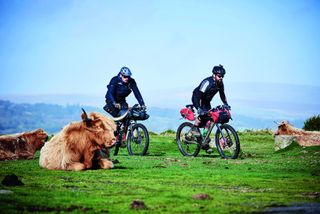
As an aside, all this mention of weight needn’t concern you too much if you’re new to e-biking – the motor/battery combo at the heart of an E-MTB (a full-sus version of which will weigh in at around 24kg) is going to help to shift all that excess baggage along with ease, whilst the design of the frame, the geometry and the overall setup of an E-MTB means the ride feel and quality is not that far removed from a regular MTB (unless you’re riding uphill, when you really will notice the difference).
E-MTB vs MTB: Tyres
You can afford to roll with bigger and beefier tyres on an E-MTB since the rolling resistance is overcome by the motor. This has several advantages, including better grip, a smoother ride and fewer punctures.
It’s also well worth going for a tubeless set up as this makes the repair of punctures far easier and quicker since you don’t need to remove the wheel (and removing the rear wheel in particular can be a bit of a mission on a heavy E-MTB).
In conclusion, an E-MTB isn’t necessarily better than a regular MTB, it’s just a different way of doing the same thing – getting out onto the trails and having a good time. Indeed, the two can even complement each other – the mile-crunching, hill climbing fun of an e-mountain bike is a different experience to the nimbleness and flow of a more lightweight regular mountain bike, but neither is necessarily best – it’s more that they’re just two sides of the same coin.
Why you should buy an E-MTB and not a mountain bike
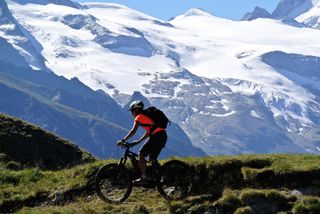
The motor – whether a seasoned vet or a first timer it will bring a smile to your face.
The ‘go anywhere’ options – from easy bridleways to gnarly downhills a good E-MTB will handle it all. You retain practically all of the fun elements of mountain biking, while losing the more arduous ones.
Why you should buy a classic MTB and not an electric one
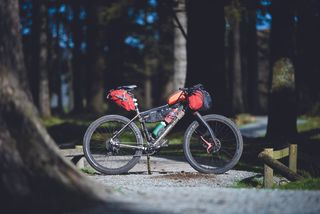
The weight – twice as heavy as a regular MTB, an e-bike can be a bit of a beast if you need to manhandle it. No motor or battery means standard mountain bikes are quick, lightweight, nimble machines for attacking the trails.
The battery – having to constantly keep an eye on the charge level can be a bit of a pain.
The price – you can get a top-end MTB for the same price as a pretty basic E-MTB.
The verdict
Price considerations aside, the choice between a regular and electric MTB boils down a couple of simple priorities. You should buy an E-MTB if you want a guaranteed smile, and you should buy a regular MTB if you want a good workout. Easy as that!
Alf Alderson is an adventure travel writer and outdoor gear reviewer who splits his time between the Pembrokeshire coast and the French Alps, where he is an 'ambassador' for the ski resort of Les Arcs.
-
 Columbia Wyldwood Waterproof Hiking Shell review: the most waterproof (and shiny) jacket I’ve ever worn
Columbia Wyldwood Waterproof Hiking Shell review: the most waterproof (and shiny) jacket I’ve ever wornIt might not have the matt finish most people expect from a jacket, but the Wyldwood really shines when it comes to protecting you from wet and windy weather
By Pat Kinsella Published
-
 Shokz OpenRun Pro 2 review: Smart bone conduction headphones with enhanced bass
Shokz OpenRun Pro 2 review: Smart bone conduction headphones with enhanced bassShokz's headphones changed my opinion about running while listening to music, and now I struggle to go out without them
By Pat Kinsella Published
-
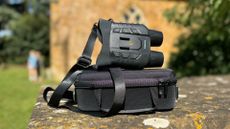 AKASO Seemor 200 night vision goggles review: unparalleled clarity for nighttime adventures
AKASO Seemor 200 night vision goggles review: unparalleled clarity for nighttime adventuresAKASO’s new NVD unlocks the night with cutting-edge colour vision technology
By Derek Adams Published
-
 Canyon Grizl:ON CF Daily review: from gravel to groceries, this ebike can do it all
Canyon Grizl:ON CF Daily review: from gravel to groceries, this ebike can do it allOne bike for every occasion, Canyon’s Grizl:ON CF Daily is a versatile steed that just rolls with it, from getting you to and from work to exploring trails on weekends
By Pat Kinsella Published
-
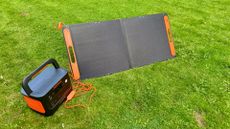 Jackery Explorer 1000 v2 review: a low-weight battery juicer for thirsty devices
Jackery Explorer 1000 v2 review: a low-weight battery juicer for thirsty devicesFuss-free electricity for the great outdoors and household emergencies
By Derek Adams Published
-
 8 must-have hiking gadgets for tackling cold and wet trails
8 must-have hiking gadgets for tackling cold and wet trailsWhether it be wet and rainy, or super chilly, these 8 gadgets can make your outdoor adventure even more enjoyable
By Bryony Firth-Bernard Published
-
 Bluetti AC240 Portable Power Station review: heavyweight champion
Bluetti AC240 Portable Power Station review: heavyweight championThe Bluetti AC240 boasts enough juice to power a boat, caravan, RV and home, though not necessarily all at the same time
By Derek Adams Published
-
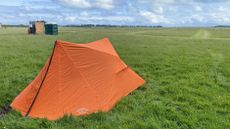 Vango Classic Instant 300 review: a festival-goer's dream tent
Vango Classic Instant 300 review: a festival-goer's dream tentSuper quick to pitch and pull down, this reasonably priced tent is spacious, tall and well-featured for festival use
By Pat Kinsella Published

